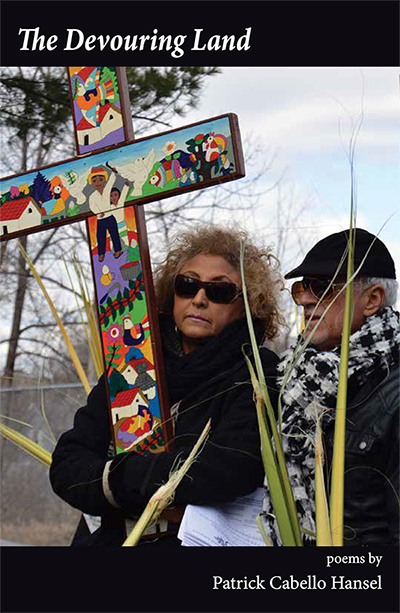poems by
Patrick Cabello Hansel
ISBN: 978-1-59948-723-6, 102 pages, $15 (+ shipping)
Release Date: March 12, 2019
$15.00
poems by
ISBN: 978-1-59948-723-6, 102 pages, $15 (+ shipping)
Release Date: March 12, 2019
 Patrick Cabello Hansel has published poems in numerous journals, including Switchback, Ilanot Review, Ash and Bones and subprimal. He has received awards from the Loft Literary Center and the Minnesota State Arts Board. His novella Searching was serialized in 33 issues of The Alley News. For 33 years, he has been a bilingual pastor in the Bronx, Philadelphia, and Minneapolis; the last 30 with his wife, Luisa. With Luisa, he founded the Semilla Center for Healing and the Arts, and is editor of their journal, The Phoenix of Phillips. Their daughters, Natasha and Talia, are also wonderful artists.
Patrick Cabello Hansel has published poems in numerous journals, including Switchback, Ilanot Review, Ash and Bones and subprimal. He has received awards from the Loft Literary Center and the Minnesota State Arts Board. His novella Searching was serialized in 33 issues of The Alley News. For 33 years, he has been a bilingual pastor in the Bronx, Philadelphia, and Minneapolis; the last 30 with his wife, Luisa. With Luisa, he founded the Semilla Center for Healing and the Arts, and is editor of their journal, The Phoenix of Phillips. Their daughters, Natasha and Talia, are also wonderful artists.
With these beautifully crafted narratives, which are both spiritual and deeply visceral, Patrick Cabello Hansel creates a powerful litany exploring the limits and demands of faith and the struggle of bearing witness to the lives of the undocumented, disappeared, and marginalized; of all those on the run from poverty and war. In these poems the unseen and the dead step forwards, take back their voices and their names, and find a place to sing. ~Jude Nutter, author of I Wish I Had a Heart Like Yours Walt Whitman
Patrick Hansel’s debut book of poems, The Devouring Land, is a necessary riposte
to the heartless, deafening conceit of the moment. These poems succeed in carrying the burden of faith, loss and love into a darkness perhaps only poetry can breach. “That what we thought was curse/ was blessing.” Poetry that turns the heart inside out to reveal women half snakes, free trade as sacrifice of the innocent, toes that grow memories rooted among the worms. Beautiful, courageous, blessings sung into the void of our ever-shriveling moment. ~Philip Schultz
We belong to the dust, the dust
belongs to no one. Ask the bones
of Domingo, who crossed into Arizona
with his six-year old son, walking
through the mountains, avoiding
the desert snakes and the eyes
burning a hole through the sky.
On the third day, they ran
out of water, and on the fourth
Domingo began to run out, his skin
tightening, his eyes wandering
through heaven and earth, the heaven
you make in your mind when flesh
begins to die, skin for skin,
bone to its bone, the heart’s fierce
surrender. There comes a moment
in time where the mind can accept
what the body knows. We belong
to the sun, the sun belongs to no one.
Domingo placed his right hand
on his son’s head, drew a crooked cross,
commanded him on. The son
obeyed with his feet. The last order
of the living is the first wish of the dead:
Keep moving.
I press the bread
in the hands of the children
whose parents have chosen
to breathe today.
Christ burrows into their skin
like a desert animal
seeking shelter.
Yesterday,
we blew on the yeast,
kneaded the flour on the flat stone table,
baked the bread in the old church oven,
practiced marching down the aisle,
bowing, saying “Amen”,
keeping our eyes on the cross
so we don’t look at our friend
who makes us giggle.
Each morning, their parents
look over their shoulders
as they prepare for work:
knives, brooms,
bedpans, shingles.
A knock, a face
at the window,
and the children fly.
Everyone knows where the papers
are stashed, the phone numbers,
the money, the drought.
Take and eat
The children dip the bread
into the blood red cup,
wait till the drops
fall off the rim,
smile. Their eyes
are migrating birds
nesting in the earthen banks
of their scented cheeks.
Wings will not wait.
Take and drink
They seem a bit out of place,
these children with this bit
of God in their hands, brilliant
in white suits and dresses,
veils and rosaries and bibles.
Kneeling at the altar,
their padrinos’ hands rest
on their shoulders
like seraphim
about to strike.
For M
Before coyotes grew knives for fingers
and narcos snapped up any girl they could,
we crossed. I was ten and we had enough
water. The desert was not as lonely
as I wished. Woodpeckers skittered
around the cactus; rattlesnakes warmed
on the rocks. I held the river inside me:
my mom leaving when I was one,
the burden my grandmother wished
over me, the land I was told to fear.
They didn’t have to tell me to be quiet
when we hid. Miguel held my hand like
my angel, but like all angels, he kept
most words to himself. At night,
when we walked through the desert,
the sky would glow to the north,
as if all the stars had gathered to sing.
Abuela told me I had a good voice, but
many nights, my throat feels like a shadow.
My brother went back, and I miss his hand.
I miss the land I can barely remember.
I like to walk in the snow—it seems
to answer my steps, not with words
but as if wishing: that I might find
home, that I might let the river run wild.
Years later, they will say they floated above the
bed or the sawdust or the backside of the alley—
disassociating the therapists will name it—
but the skin can never flee. The skin
can never pretend it is somewhere else
or something else. A piece may be torn
away by penis or knife or fist, but the rest
of the dermis stands duty, defends,
keeps the insides in. A hand cannot hold
a pencil or a radish without skin. A foot
cannot walk to the bathroom at night,
knowing each wall has wounding wound
into it. When you skin your knee, you scrape
the skin off, not the knee itself. When someone
calls you thin-skinned, they mean your skin
cannot protect your soul. We survive
by the skin of our teeth, but look at your
teeth in the mirror—if you can stand
to see—and see how much skin is on each
incisor and canine pointing there. The men
knows what teeth are for, what apple
or peach may offer once the skin is pierced.
To them, it is about the juice: where it can
be found and how to get the most of it. Skin
is an impediment to them, a dainty thing
that reminds them of silk, spun by stupid
worms, too strong to control, too pretty
not to own. Skin covers meat, and meat
is what we’re made of. Blood red and sizzling.
If they could take you without you ever
touching their own skin, they would. Remember
that—as if your skin will let you forget.

